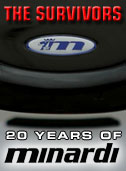
with Gian Carlo Minardi
Atlas F1 Assistant Editor
Not many men alive today have a Formula One team bearing their name, and among those only one no longer owns the company he founded and lead into the sport. Gian Carlo Minardi can still be seen in the paddock every GP weekend, he is still working at the team's factory in Faenza, and he is still very much emotionally bound to his 20-year old baby. Atlas F1's Michele Lostia met Signor Minardi for an in-depth interview about Enzo Ferrari, Bernie Ecclestone, Ron Dennis, Paul Stoddart, Ayrton Senna, and two decades of survival in a British-centric sport, despite not speaking a word in English. Exclusive for Atlas F1
There is, however, one more manufacturer that emerged from Italy in the
eighties, and through a few ups and many downs still lives on. This is the
small Minardi team who, after 20 seasons of Formula One, are the fourth
oldest surviving outfit in the paddock, only behind top teams such as
Ferrari, McLaren and Williams.
Faenza, a small town less than 70 miles away from Maranello, but light
years away in terms of F1 success, is where the manufacturer's factory is
based, and that's where I get to meet Gian Carlo Minardi, founder and
owner-turned-employee of the team which still bears his name.
Between Maranello and Faenza
Signor Minardi, a warm, talkative and down to earth man as you would
expect from someone from the Romagna area in northern Italy, has been
breathing exhaust fumes for his entire life. "I was born among racing
cars," he begins. "My father built a car called GM75, with an inline
6-cylinder engine, and my family for years owned a Fiat dealership. When I
turned 18 plus one day I obtained my driver's license and tried my hand at
racing with very poor results, so I gave up immediately. For two or three
years I took no interest in it.
"Then some friends, who created a team called Scuderia del Passatore,
asked for my help, because they couldn't manage it with the money they
invested in it. So that's how it started."
Minardi won the Formula Italia series and with the prize money bought
their first Formula Two car, "and we did this up to 1979 by buying in
England the best cars around - March, Ralt, Chevron," he says. By 1980,
Minardi became an F2 constructor, making his debut in Formula One in 1985.
But Minardi had his first taste of Formula One a decade earlier when,
having changed the name of the team from Scuderia del Passatore to
Scuderia Everest, he got a deal to run a few tests and a couple of
non-Championship races with none other than Enzo Ferrari, who gave his
compatriot a 312 B3, which the Maranello-based team used in the 1973 and
1974 seasons.
And that's how the last entered Ferrari privateer has ended - with a
retirement on the warm up lap at Brands Hatch and an early exit at
Silverstone. The driver then was Giancarlo Martini, uncle of the more
famous Pierluigi Martini, who loyally drove for Minardi in Formula One for
many years.
The deal with Ferrari also included a supply of Dino V6 engines in F2,
which Minardi confirms they used for "two seasons, in 1977 with the Ralt
car and in 1978 with the Chevron."
ML: Did you know Enzo Ferrari well?
Minardi: "Pretty well. I had the fortune in 1974 to be called by Luca
Cordero di Montezemolo (then sporting director at the Maranello-based
team) because Enzo Ferrari wanted to meet me. The collaboration with the
B3 started then, followed by the collaboration with the engines. For two
years I practically commuted almost every day to Maranello.
"Enzo was undoubtedly an important role model, a man with feelings. He
could be a difficult man but was also incredibly interesting, and I'm
proud to have had the experience of knowing him because not many have had
the chance of doing that. I could call him and within an hour he would
meet me, so I think this is a sign of affection on his part towards me. He
awarded me with some responsibilities which at times were higher than what
I could do, so he evidently trusted me. It was a nice relationship, but
unfortunately he died in 1988."
Gian Carlo Minardi stopped buying cars and became a proper constructor
in 1980. With his own cars, he entered five more Formula Two seasons,
winning his only Grand Prix in the meantime at Misano in 1981, with the
late Michele Alboreto at the wheel. The Formula Two championship ended in
1984, to make way for Formula 3000 the following year, but Minardi had
already decided to join the big boys in Formula One regardless what the
lesser series would evolve into.
The first misfortunes in F1 for Minardi, and perhaps a sign of things
to come, occurred even before a wheel turned: "We started building the F1
car in 1984 and the first steps were taken with the Alfa Romeo engine
because Mr Massaresi, then president at Alfa, guaranteed that he would
supply us with engines. But then fights more or less amongst Italians -
there was another team (Osella) with Alfa Romeo engines - meant that we
didn't get them."
ML: Considering you were supposed to use Alfa Romeo engines, was the
Motori Moderni a let down?
Minardi: "No, it wasn't. It was a good experience first of all because
of Chiti, who is a character almost impossible to find in today's world of
motor racing. It was good also because one of the shareholders also had a
stake in Minardi, and that is Piero Mancini, who put in a lot of effort.
Unfortunately we weren't competitive because of lack of money."
Lack of money has been a constant in the private team's life. "Perhaps
our hopes were too high, because building an engine is an extremely steep
challenge, and our budget was laughable, like now. Even with a budget like
that, however, building the engine allowed us to stay alive until the
change to the normally aspirated engine, but those were difficult years,
obviously. Just think of the year when we had to run a Grand Prix with
just 150 litres of fuel, think of the kind of technology needed then at
the electronics level."
The Struggle at the Bottom
The end of the eighties, with a gradual ban on turbo engines, saw a
massive improvement in Minardi's performance. First came the naturally
aspirated Cosworth engine, prepared by renowned Swiss engine tuner Heini
Mader in 1988, then came support from tyre-maker Pirelli in 1989, and
finally came a supply of customer V12 Ferrari engines for the 1991 season.
The highlights of those years for the Faenza-based team were a lap in the
lead at Estoril in 1989, and a start from the front row in 1990 at
Phoenix.
ML: Between the late 80s and the early 90s, did you ever believe you
could have won some races?
While Minardi already had a customer deal with the Maranello-based team
in the seventies, by 1991 they managed to secure the deal through what
Minardi calls "a series of coincidences."
"Cesare Fiorio, technical director at Ferrari then, believed in what I
still think would have been a valid strategy: to have a junior team that
grows drivers, engineers and mechanics. Consider that Ferrari needed until
1995 or 1996 to become competitive again, and only later became today's
invincible team. Looking in retrospect now I think that, by doing what we
often thought of doing back then, we could have saved them some time, and
the costs wouldn't have been much higher."
Minardi sums up that 1991 season thinking of the missed opportunities.
"If we had more support - my fault for not having found it - the team
could probably have made a major step forward. 1991 was an exceptional
year, even if we could have done better. We were many times in the middle
of the fight, and often we had technical problems which weren't our
fault."
The year ended with Minardi scoring only two fourth places, which are
still the best results in their history. With not much to show for, the
money didn't flow in, and the team wasn't able to hold on to their engine
supply from Ferrari. "I had a three-year contract which unfortunately I
wasn't able to uphold in 1992. It took me some time to honour the
commitments in 1991, but from then on it was the start of a string of
misfortunes because, in order to honour those commitments, I started
selling stakes in the team, all the way to this day when the team is 100%
Paul Stoddart's."
In those seasons of high hopes it could have been reasonably feasible,
with some help from Lady Luck, for Minardi to score some podiums or even a
win. While the ex team owner has difficulties imagining how different life
could have turned for his outfit if they scored a victory, he illustrates
when he thought he had a realistic chance of getting that result.
"Australia 1989," he reveals. "We had the third fastest time on the grid,
while the first row was occupied by a driver named Senna and another one
named Mansell (he means Prost). We were on Pirelli tyres and were just a
few hundredths behind. In the Sunday morning's warm-up we stopped mid
session as we had the fastest time, which ended up being the second or
third best.
In their twenty-year history, Minardi never again reached the highs
they did in the late eighties and early nineties. In fact, the last few
years saw them struggling to even score a single point per season: in the
last nine years they scored points in only three seasons, the highlight
being Mark Webber's fifth place in Melbourne on his debut in 2002.
But there have been more cases of missed opportunities and bad luck.
When a rain storm swept over the 1999 European Grand Prix, held at the
Nurburgring in Germany, many of the main players either spun off or
suffered collisions. Italian Luca Badoer, then driving for Minardi along
with Spaniard Marc Gene, kept his cool and was running in fourth position,
until his gearbox expired with just 13 laps to go.
"That was very painful," Minardi recalls, "because it was one of those
opportunities which could have made history for us. Badoer did a fantastic
race, and was perfectly supported by the team. It's one of those races
where I don't know if third place would have been enough for us.
"Unfortunately there was a problem with the gearbox which we never
suffered from neither before nor after, and it wasn't an old component. A
technical error should never be called misfortune, but hell, a component
broke preventing Badoer from scoring an exceptional result! Luckily Gene
controlled the attacks from Villeneuve and we ended up sixth."
Last year, when another rainstorm hit the Interlagos circuit at the
Brazilian Grand Prix, both Minardi drivers retired after having spun off
at the same corner. Briton Justin Wilson and Dutchman Jos Verstappen had
their race-ending spins on lap 15 and 30 respectively, when the former was
in 12th position and the latter in 8th. After the race, however, came
Minardi's team boss Paul Stoddart's somewhat surprising claim that
"Minardi was potentially in a genuine, race-winning position." He further
added that "only those of us within the team will ever know the truth. We
had the strategy, but not the luck."
"We were in front with a good advantage over Fisichella, who himself
said that he couldn't get closer to Verstappen. Before Verstappen lost
control of the car he was in front, with an advantage he was maintaining
lap after lap, and the race was shortened. The result could have been an
exceptional boost for us."
Last year's French Grand Prix held at Magny Cours offered a unique
sight: after qualifying, two Minardis were on the front row. Unfortunately
it was just the first, non-decisive Friday qualifying session, and the
result was obtained thanks to the drying track which favoured the late
runners. While Justin Wilson soon had his time disallowed due to his car
being slightly underweight, provisional pole setter Jos Verstappen was
pushed back to the last row of the grid in the Saturday session.
ML: Did Verstappen's provisional pole at Magny-Cours last year mean
anything to you?
Minardi: "Well, it was funny: there wasn't anything to it from a
technical or sporting point of view. It was just a coincidence happening
to us which we fully took advantage of, but unfortunately not with both
cars because of a banal error in the garage, as it would have been a 1-2
otherwise. It was nice because it led to things I didn't expect, like
phone calls I hadn't received for a long time. In the five minutes after
the end of qualifying I received phone calls from five different
continents. If one considers the different time zones, it shows the level
of awareness F1 has reached, which is an important signal for marketing.
The event was funny, joyful and enjoyable: a glimpse of glory and TV
exposure which can't be bad for the team."
The F1 Prep School
In three decades of participation in the upper formulae, Minardi has
provided race seats to some famous drivers. Elio de Angelis, Clay
Regazzoni, Johnny Cecotto and Michele Alboreto graced the team in their
Formula Two years, while Pierluigi Martini, Andrea de Cesaris, Alessandro
Nannini, Christian Fittipaldi, Alex Zanardi, Giancarlo Fisichella, Jarno
Trulli, Fernando Alonso and Mark Webber joined the team - mostly for their
debut drives - in Formula One.
As Minardi refuses to name the best ("there isn't one") or anyone who
let him down ("I backed them even if they did"), he confirms that it was
"a reason to be satisfied" when, at the Italian Grand Prix last year, 40%
of the grid was occupied by drivers who, at one time or another, raced for
his team. But he adds that it's not just drivers continuing their careers
at other teams, but also technicians. "It's a matter of pride but
sometimes also of regret: once I jokingly said that, [if we had] a three,
four or five-year [technical and financial] programme, I'd like to put an
ad in the paper where I'd call for every ex Minardi technician to come
back working with us. It'd be a very strong team."
One of those technicians who worked for several years at Minardi is
Italian Aldo Costa. He is about to take over the reins of chief designer
Rory Byrne at Ferrari, and next year's car from Maranello will indeed bear
his signature. "He's one of those technicians who, if he didn't work for
Minardi then, probably wouldn't be at Ferrari now," Minardi comments.
"He had many years of experience in Minardi. In 1988, at a very young
age, he was given, along with many other technicians, the challenge of
bringing forward a car mid season, and to prepare a new car for 1989,
which turned out to be a car that radically changed Minardi's strategies.
I hope he can say - and if he doesn't I hope he at least thinks - that
Minardi was an important training ground for him. He was technical
director here at 25-26 years of age, which certainly was an important
experience that helped him going to Ferrari and doing what he's done
there."
When asked to remember an anecdote about one of his drivers, Minardi
says: "the most grotesque sporting one I can think of is about
[Argentinean] Esteban Tuero, who at the age of 20, on the 12th January
1999, told me he wouldn't race anymore."
Tuero never explained the reasons for his retirement, and Minardi says
that he's not interested in that anymore. The experience was, however, a
lesson to remember. "[It] made me think that I need to be careful now when
I deal with 20 year olds, because at that age drivers can get upset or
attracted by other things which aren't my business."
ML: Is there a driver that you would have most liked to race with
you?
Minardi: "Now don't call me crazy, even if at 57 I might be on my
way... There was a very important year where another driver just as
important was there, and he had at least thought about it... It was a
difficult moment of transition for him, he was having all sorts of
thoughts. It was a driver I loved dearly, and unfortunately he's not
around anymore."
ML: You mean Ayrton Senna...
Minardi smiles. "Yes. It was probably just a dream, but there had been
many late night phone calls with exchanges of opinion. There was a moment
where I thought the dream might have turned into reality."
ML: Is it true that he would come over to your motorhome to eat
pasta with you guys?
Minardi: "Yes, but in an unseen way because Ron Dennis didn't want him
to."
The Italian was recently quoted as saying that Hungarian Zsolt
Baumgartner, who's driven for the Faenza-based squad in 2004, was likely
to stay at Minardi next year. While the ex team owner is quick in telling
me that he was misquoted, as "it's not up to Gian Carlo Minardi to decide
the 2005 drivers, but it's only up to Paul Stoddart," I ask him how
important continuity would be for his outfit, in the event that a driver
stayed on for a second season at the team.
"Obviously we'd have one more reference point," he explains. "To have a
driver who has raced in every GP and has driven the car - albeit a
different one this year both in the engine and in the tyres - would be one
less variable. We are used to have new drivers every year, but it would be
nice if one of them stayed on."
ML: Of the current drivers, Fisichella, Trulli, Alonso and Webber
all debuted with Minardi. Who among them is the best to work with?
Minardi: "Those are drivers with a race contract, and there are others
with testing contracts like Gene, Badoer, Davidson. They are all drivers
that deserve to be in F1. This year there's been an important revolution
in car strengths, so I hope these drivers will show their worth. In my
humble opinion they are all winners so I hope the teams they joined will
let them show what they can do."
Minardi: "I don't scout no one, I just pay more attention than others.
I get some help by other people, like my son who follows in my footsteps
by looking at every championship. I pay attention to the information I
get, I have my own way of rating - which is probably different from others
- and sometimes, with the blessing of Stoddart, I let some deserving
drivers have an F1 test. So it's not me discovering them, it's them
discovering themselves, because I have neither a magic wand nor the
strength to go pick them up in go-karts and bring them up hand in hand."
ML: Did you see the Race of Champions in Paris last week? Heikki
Kovalainen beat David Coulthard, Jean Alesi...
Minardi: "Kovalainen was tested by us last year together with Jose
Maria Lopez. These are two drivers contracted by [Flavio] Briatore and
Renault. My opinion is very high of them, but Kovalainen has more
experience than Lopez as the former is 22 while the latter 20. They are
two drivers who deserve a more important stage, besides the Race of
Champions which is one of those races - even we won the [Bologna] Motor
Show with the F1 car, by beating more important teams than ours - it's one
of those races which are nice for bringing the public closer to racing,
more than a Grand Prix can do, but that's it. However I can say that
Kovalainen is one of those drivers deserving more."
ML: So have you called Briatore to give Kovalainen his F1 debut?
Minardi: "Unfortunately ours is a team where it's Briatore that has to
call Minardi, because if Renault believe in Kovalainen they have to help
Minardi. There's no use in hiding behind a glass: we live on TV rights and
sponsorships, part of which are tied to commercial interests generated by
the drivers in their nations. Today Italy is one of those nations which
are unfortunately out of those commercial activities.
"I see the Italian sport scene to be in great difficulties. I can't
explain why in go-karts we win in every category, but then there is a big
void in the upper series, which are the ones that lead to the professional
championships. So there is an incorrect training policy, certainly there
is a lack of money, but no one wants to help. There's probably enough to
say about it to fill a book."
The Bean Counters
Alarm bells, however, are always ringing for Minardi who, according to
the press, are always on the brink of folding up. The team's founder,
however, gets annoyed by those reports. "90% of the time these are just
unfounded speculations. We are obviously a team at risk, but if we tell
what kind of budget we face the season with, it upsets the big teams as it
is rather unbelievable what we are able to achieve with so little. It
upsets me because we have made our part of history in these last 20 years,
so I'm displeased that Minardi's work isn't valued the way it should be.
"Obviously if you asked me if I'm happy about the results, I can't be,
because in 20 years we have never reached the podium, which is the first
objective we've ever set for ourselves. But it is also true that in many
occasions we've had rotten luck, while in others we've been lucky, so
we've paid our dues to be within the ten teams in 2005."
ML: How much more money would Minardi need to become a mid field
team again?
Minardi: "After having survived 2004 with a budget of less than 28
million euros ($37 million USD), the team hope to go over 40 million euro
[$53 million] for 2005. What do Minardi need? A three-year programme. This
is a team of 110 people, with a technical structure some parts of which
can be improved only through a three-year programme.
"It's not like I'd go anywhere if you gave me 100 million euro. We need
50 million euro [per year] because if I spend less than that I'd just
consolidate my tenth place closer to the top teams. But with that amount
we could obtain some good performance, get some results, and start
improving through our three-year programme. After the three years, after a
re-organisation of the company, and after having obtained some technical
parameters with the top teams, based on the investment one can climb up
the World Championship ladder.
"Of course, it would be unthinkable, even with 50 or 60 million euros -
which I wouldn't know where to find anyway - to be able to beat teams with
over 100 million euros. It's inevitable that part of that goes into
aerodynamics research. The rules we have today are such that whoever can
be in the wind tunnel 24 hours a day for 20 days a month will beat Minardi
in closing the technical gap."
ML: Indeed some believe the various cost-cutting measures are just a
way of closing the gap between the teams, and specifically diminishing
Ferrari's advantage...
"So, changing the regulations is neither an advantage nor a
disadvantage for Ferrari. The rest have to start working in the same way
as Ferrari. Since they have the capability and possibly the finances, if
they lose it's their fault. If the regulations will be respected I think
the big teams will have big advantages and benefits, and if they do they
could be able to help the little teams. A team like ours pays an important
amount of money to have an entry every year in F1, so perhaps it should be
our right to be supported more by the FIA - although this is my personal
view, not the team's."
ML: So what would you do to cut costs?
Minardi: "A lot has been done, so I'd like to see how it works now. The
costs should be reduced through the sporting regulations rather than the
technical ones, because I don't want to prohibit Fiat, Mercedes, BMW,
Honda, Toyota and Renault to do their development work. What I want is
sporting regulations [regarding] for example the pitstops: with only two
sets of tyres for the weekend, if we do the pitstop with just six people
instead of so many, maybe it will cut some costs by half. Another example
is that nobody prevents you to have the engine at 20,000 revs, but they
tell you to have the same engine for two races. But this is not a cost for
the F1 teams: it's for the engine manufacturers and their budgets.
"It's indispensable to cut costs, but we must also find other incomes.
Minardi is more interested in finding other incomes because it's
impossible to further cut costs for us. So I think that today we need to
stay with our feet on the ground and think about what's right and what is
a waste of energies. Minardi have no interests other than sport, besides
investing all the money we can gather around to do what we are able to do,
so I invite the others to do the same thing. They have to cut the costs,
while we only need to increase our income, which will be an asset for them
too, because there is a big conflict for sponsorships today so it must be
faced in a certain way."
ML: Should the extra income come from sponsorship or from TV rights
and such?
Minardi: "Today there are incomes that revolve around F1, without F1
getting any benefits from them because they end up elsewhere. It would be
right if the players that provide the spectacle gained - based on the type
of participation they have, be it main players or bit parts - an income
which should be superior to what they get now. But whether it's superior
or inferior, everything that goes in the pot should be divided in a
certain way and not just favouring the one who has played this game for
many years."
It's obvious that Minardi is referring to Bernie Ecclestone, Formula
One's supremo, who turned this sport into the rich business it is today.
Minardi: "I've never seen that money. They don't exist in the books. In
my opinion - and he denied it too - Ecclestone has never been a partner of
Stoddart. He probably took back a quote ('Minardi should go') which was
neither classy nor nice, and especially not relevant. He never denied it
in public but only in private that he ever entered Minardi's share
capital. I can guarantee you that he never entered Minardi's share capital
from a technical point of view. The capital is 100% Paul Stoddart's, so
I'm not able to give you an explanation for whatever that was about."
ML: He never entered Minardi's share capital, but has he given a
donation or something?
Minardi: "No, absolutely not."
ML: Did your opinion of Ecclestone change that day?
Minardi: "No. That quote, like others, showed me what F1 is all about:
everything and the opposite of everything. It's difficult to explain stuff
especially when you are not there in person like when I was the president:
I would go to the F1 meeting without knowing English and perhaps I would
understand more then than today, when we are told once in a while what's
the state of the art.
"I've been in F1 for 20 years. When I got there Bernie Ecclestone was
around already. I probably saw him more active, lively, decisive, and more
into making decisions back in the nineties. These days I don't know
whether it's the political pressures by the car manufacturers - who were
wanted by himself and made the costs soar, obviously at his advantage - or
whether it's his own tiredness, but I see him less active and decisive
than he was during F1's important years."
ML: Ecclestone is now facing strong opposition from the car makers,
the GPWC, who are threatening to create a new series in 2008. Do you think
this is for real?
ML: Ferrari's president, Luca di Montezemolo, said there won't be
two series. He said there will be GPWC, while F1 won't exist anymore
because everyone will move to the new championship
Minardi: "I don't have a crystal ball, so I can't see what will happen
in 2008. Minardi's challenge is to survive. If what di Montezemolo said
will come to fruition it will probably be an important step for us,
because it could mean survival without going looking for sponsorships. I
hope the search for a decrease of costs, which is vital for the future of
F1, will be linked with an increase of incomes, and then we'll see who
will be doing the organising. Unfortunately F1 is in a bit of trouble,
because I'm 57 years old and so is di Montezemolo, but everyone else is
older, so we are in a phase where you don't know if you are around
tomorrow. We need to be realistic, especially with programs four years in
the future."
Team Principals
In their struggle to make ends meet, the Minardi team have for many
years welcomed investors. In 1996, Italians Flavio Briatore and Gabriele
Rumi bought shares in the team, and while Briatore soon sold his part to
Rumi, the latter held on to his shares until he fell ill with cancer.
Before losing his battle against the disease in 2001, Rumi sold his shares
to Australian businessman Paul Stoddart, who became the sole proprietor of
the team.
ML: How does it feel being an employee in a team which was once
yours and still bears your name?
ML: How did you meet Paul Stoddart?
Minardi: "It was probably around one of Minardi's most difficult
moments, because with our president and major shareholder Gabriele Rumi -
who we miss very much as a person, as a man, as our president, and
especially as a man of sports - we got to a difficult point with our
financial situation. He felt a little bit abandoned by everyone and unable
to fight against these misadventures, as he was suddenly hit by a disease
which killed him in a very few months. So that was the worst moment. Paul
Stoddart, who had already expressed the desire to be involved with a team,
was sent here by Bernie Ecclestone, making it possible to carry on in this
enterprise by giving him the block of shares."
ML: I suppose the relationship you have with Stoddart is quite
different from the one you had with Rumi...
Minardi: "Definitely, also because with Rumi I was in constant contact
through tele-conference; it was as if he was here. He was the president,
and even if sometimes there had been some conflicts over the decisions
needed to be made, those conflicts were healthy for the company. With
Stoddart, besides the language problem which is only solved through
Fabiana [Valenti, Minardi's press officer], there isn't the daily contact
which I had with Rumi. [Stoddart] gives me problems to solve, leaving me
with plenty of freedom in doing so, obviously under his direction. These
are different ways to interpret the company: only by looking in retrospect
we'll know who's right."
ML: Does Stoddart often consult you before taking decision?
Minardi: "No. Maybe once a month I express my ideas, but he takes his
decisions independently from what I think. He left me my office and a
certain degree of liberty, so I move with caution in the space I'm
allowed, without stepping out of the boundaries where I've been placed to
work in."
Minardi: "That's difficult to answer because I honestly haven't
confronted the fan base for a while, as for various reasons it's not the
right thing for me to do. It's obvious that the positions taken by
Stoddart are strategic and political. I don't know the projects, the
programmes or the reasons why he's taken certain positions, but I think
that they are undoubtedly done with the good of the Minardi team in mind,
so I cannot criticise him.
"It's obvious that for many years I've had a different relationship
both with the fan base and with the press, but mine is probably a Latin
way of facing problems, while now we have an Anglo-Saxon who lives, moves,
and speaks like an Anglo-Saxon."
ML: Last year McLaren owner Ron Dennis said that Jordan is more
deserving of help by the big teams than Minardi, because Eddie Jordan
complains less than Paul Stoddart. What do you say to that?
Minardi: "Ron Dennis doesn't deserve... I'm not interested in what Ron
Dennis said. Ron Dennis is an individual with whom I've never had a [good]
feeling, and probably I don't have it because in Formula Two I troubled
him with less money than he had. I have a regret: I was held back in May
1977 when Miguel Angel Guerra didn't follow my order and Dennis came
storming by my pit wall at Mugello. If I wasn't held back then perhaps
there wouldn't be a Ron Dennis now."
ML: What happened?
Minardi: "I was by the pit wall. My driver then was Miguel Angel
Guerra. He didn't stop when practice ended and did one extra lap. So
Dennis came over looking threatening and being offensive with phrases
including Italians, spaghetti and so on. I had a reaction that I usually
don't have - but back then I was young - and they held me back. If they
didn't, Ron Dennis wouldn't probably have reached F1."
"Really, Mr. Ron Dennis doesn't acknowledge me when we meet. He's a
rude person, and he'll keep being one. I acknowledge him, he doesn't. He's
a rude person out of this world, so he should avoid passing judgement on
others. Ron Dennis and I have always had little sympathy for each other.
He was annoyed by the fact that I don't speak English so I'm annoyed by
the fact that he doesn't speak Italian. We've always had arguments in F2
meetings. He's a character who doesn't deserve any reply nor comment.
Perhaps he's had more luck than ability in life so far."
ML: Enzo Ferrari didn't speak English either...
"In my humble opinion, instead of coming out with statements that we
should fold like he said, we should make him realise - and this annoys him
- that you can't build a factory the way he's done, which cost I think 600
million euros, and it doesn't have anything to do with making up half a
second, a second, or a second and a half to get in front of Ferrari on
track."
ML: OK, no need to ask you who is your least favourite manager,
then... But who's the best manager in your view?
Minardi: "For a long time it was Frank Williams. But today I honestly
don't agree anymore with him. I took a lot of inspiration from Frank
Williams in my way of working and organising, but today I wouldn't follow
him anymore. There have been many mistakes, the biggest of which is with
the two drivers he's had up to now. How can you impose discipline,
fairness, work ethics? The tenths of a second must be found all together:
it only takes one person to pull the cart the other way..."
ML: Being a Formula One team owner has also left you exposed to
legal investigation, in the last three years...
Minardi: "Yes, and it isn't over yet."
ML: What is it about?
Minardi: "It was about sponsorships. Unfortunately, we were involved
through an international rogatory investigation we had nothing to do with.
Unluckily not everyone is clean and bleach-washed, so we got involved. The
first hearing was held last week and now the trial phase should follow. I
hope we'll come out of it cleanly because I can guarantee you that we have
not done the things for which myself and our financial director Stefano
Sangiorgi are accused of. If things were done wrongly it was in an effort
to keep alive a company made of 120 people who have above average wages."
ML: What were you accused of?
Minardi: "Falsification of accounts, deduction, forgery of invoicing...
all that stuff linked with the world of sponsorships."
ML: So with all the hardships along the way, do you have any regrets
in starting the Minardi team?
Minardi laughs. "No, I do not regret anything. if you ask me if I would
do something or anything different, if I could go back to the past, then
many things could be done differently. Everyone in life makes mistakes,
but if I could begin everything again - I wouldn't do it any other way."
The history of motorsport is full of
evocative names of great Italian cars, among them Fiat, Alfa Romeo,
Lancia, Maserati, and of course Ferrari. While most of these manufacturers
have through the years disappeared from the racing scene, with some of
them making half-hearted comebacks, the world of Formula One has been
completely dominated by Ferrari since the end of the last century.
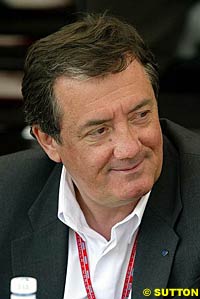 But for the
last two decades, Italy has seen more than just the red cars from
Maranello gracing the pinnacle of motor racing. The eighties and the
beginning of the nineties gave birth to a multitude of small teams from
the Mediterranean country, with varying degrees of success. There were
Osella, Dallara-Scuderia Italia, Coloni, Forti, Andrea Moda, Fondmetal,
and of course Italy-owned but England-based Benetton, who even went on to
win Championship titles with Michael Schumacher. The last of those names
disappeared from the F1 scene when Benetton became Renault in 2002, having
been bought by the French manufacturer the previous year.
But for the
last two decades, Italy has seen more than just the red cars from
Maranello gracing the pinnacle of motor racing. The eighties and the
beginning of the nineties gave birth to a multitude of small teams from
the Mediterranean country, with varying degrees of success. There were
Osella, Dallara-Scuderia Italia, Coloni, Forti, Andrea Moda, Fondmetal,
and of course Italy-owned but England-based Benetton, who even went on to
win Championship titles with Michael Schumacher. The last of those names
disappeared from the F1 scene when Benetton became Renault in 2002, having
been bought by the French manufacturer the previous year.
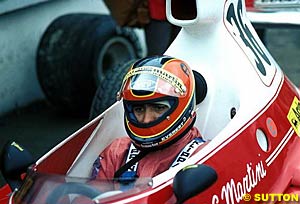 "We used [the Ferrari car] in 1975 and 76," says Minardi. "In
1975, with the B3, we gave a first taste of F1 to five or six drivers at
Misano, while in 1976 we went racing at Brands Hatch [in the Race of
Champions] and at Silverstone [in the International Trophy race]. Then we
gave the car back because the game was over."
"We used [the Ferrari car] in 1975 and 76," says Minardi. "In
1975, with the B3, we gave a first taste of F1 to five or six drivers at
Misano, while in 1976 we went racing at Brands Hatch [in the Race of
Champions] and at Silverstone [in the International Trophy race]. Then we
gave the car back because the game was over."
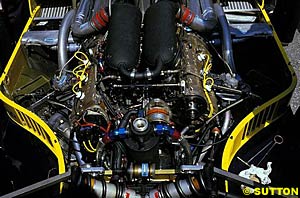 Making a virtue of every necessity, the team was quick in finding
an alternative. "There was a revolution at Alfa Romeo when their engineer
[Carlo] Chiti resigned. This led to the birth of Motori Moderni, which was
nothing but one Minardi shareholder who, together with Chiti, built a
racing engine for Minardi. It was a turbo V6 and it was built in less than
six months, but we still had to do the first two races [of 1985] with a
Cosworth engine. We then modified that car, which had the same engine
fittings for both the Cosworth and the Motori Moderni, and continued the
season with the 6-cylinder. 1985, 1986 and 1987 were difficult years,
because to race for three seasons with a private turbo engine was a very
hard thing to do."
Making a virtue of every necessity, the team was quick in finding
an alternative. "There was a revolution at Alfa Romeo when their engineer
[Carlo] Chiti resigned. This led to the birth of Motori Moderni, which was
nothing but one Minardi shareholder who, together with Chiti, built a
racing engine for Minardi. It was a turbo V6 and it was built in less than
six months, but we still had to do the first two races [of 1985] with a
Cosworth engine. We then modified that car, which had the same engine
fittings for both the Cosworth and the Motori Moderni, and continued the
season with the 6-cylinder. 1985, 1986 and 1987 were difficult years,
because to race for three seasons with a private turbo engine was a very
hard thing to do."
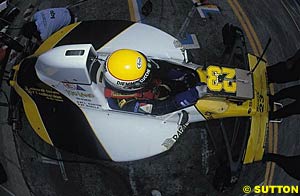 Minardi: "Yes. I believed it when in 1989 and in the early
nineties there was a major turnaround as we were starting the races from
the first three rows of the grid. We had a great customer engine (the V8
3,500cc Ford Cosworth DFR) prepared by a man called Heini Mader, who I'd
still love to have around my table. It was an engine with which we'd do
about 1,500 Kms because our finances wouldn't allowed us to do less, but
we were supplied for the first time by a tyre colossus like Pirelli. Those
two years, which opened the door for us to become the first team to have a
customer Ferrari engine, were a real turnaround."
Minardi: "Yes. I believed it when in 1989 and in the early
nineties there was a major turnaround as we were starting the races from
the first three rows of the grid. We had a great customer engine (the V8
3,500cc Ford Cosworth DFR) prepared by a man called Heini Mader, who I'd
still love to have around my table. It was an engine with which we'd do
about 1,500 Kms because our finances wouldn't allowed us to do less, but
we were supplied for the first time by a tyre colossus like Pirelli. Those
two years, which opened the door for us to become the first team to have a
customer Ferrari engine, were a real turnaround."
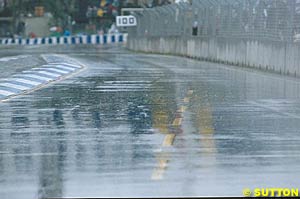 "But in the
afternoon the universal flood came, and we ended up sixth out of the
eleven drivers who finished the race, because the Pirellis weren't at
their best in the wet. The fact that we got to the chequered flag means
that the car passed the challenge of 300 Kms on track, so perhaps that day
could have been our day of glory since the car, the driver and the tyres
were perfect for that circuit. It's a real shame because I don't think
that universal flood can be called anything other than misfortune."
"But in the
afternoon the universal flood came, and we ended up sixth out of the
eleven drivers who finished the race, because the Pirellis weren't at
their best in the wet. The fact that we got to the chequered flag means
that the car passed the challenge of 300 Kms on track, so perhaps that day
could have been our day of glory since the car, the driver and the tyres
were perfect for that circuit. It's a real shame because I don't think
that universal flood can be called anything other than misfortune."
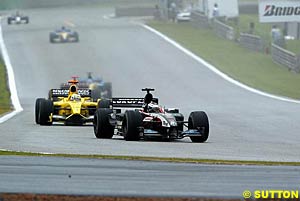 Gian Carlo Minardi explains a little more how that could have
turned into reality: "I can only say that our drivers made a mistake,
along with other drivers, on the same corner, while Verstappen was in
front of [eventual race winner, Giancarlo] Fisichella. It's up to you to
decide..."
Gian Carlo Minardi explains a little more how that could have
turned into reality: "I can only say that our drivers made a mistake,
along with other drivers, on the same corner, while Verstappen was in
front of [eventual race winner, Giancarlo] Fisichella. It's up to you to
decide..."
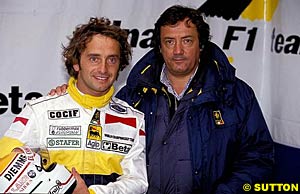 "There are 34-35 drivers that have had the opportunity to drive
in F1 with us and we had the luck of working with them. They are all
extremely important because when they raced with Minardi they helped us
staying alive in every sense. From an affection point of view, the only
exception is [Pierluigi] Martini, because he did 103 Grands Prix with us,
and that's an important part out of the 321 we've raced so far.
Practically a third of Minardi history was written by Martini."
"There are 34-35 drivers that have had the opportunity to drive
in F1 with us and we had the luck of working with them. They are all
extremely important because when they raced with Minardi they helped us
staying alive in every sense. From an affection point of view, the only
exception is [Pierluigi] Martini, because he did 103 Grands Prix with us,
and that's an important part out of the 321 we've raced so far.
Practically a third of Minardi history was written by Martini."
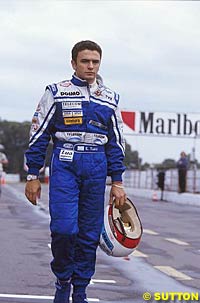 Tuero had
already raced the previous year at Minardi, and made a good impression.
"He said that morning that only himself could say why he wouldn't race
anymore. We were sitting around a table, with sporting director Cesare
Fiorio, our president Gabriele Rumi, his Argentinean manager Eduardo
Ramirez, and myself, and we were left with our jaws dropped. He said that
and just left. We didn't even notice his taxi was waiting outside. He
disappeared and I never heard from him until 15-20 days ago when he called
me, years later, to ask me for a phone number. I didn't mention that
episode, gave him the phone number, and that was it."
Tuero had
already raced the previous year at Minardi, and made a good impression.
"He said that morning that only himself could say why he wouldn't race
anymore. We were sitting around a table, with sporting director Cesare
Fiorio, our president Gabriele Rumi, his Argentinean manager Eduardo
Ramirez, and myself, and we were left with our jaws dropped. He said that
and just left. We didn't even notice his taxi was waiting outside. He
disappeared and I never heard from him until 15-20 days ago when he called
me, years later, to ask me for a phone number. I didn't mention that
episode, gave him the phone number, and that was it."
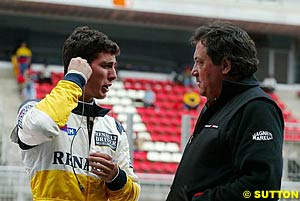 ML: You have a reputation of being a talent scout, which is
what you do here at Minardi too, isn't it?
ML: You have a reputation of being a talent scout, which is
what you do here at Minardi too, isn't it?
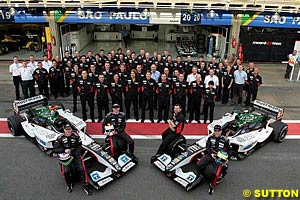 With the
disappearance two years ago of the Prost and Arrows teams, Formula One has
embarked on a campaign towards cutting costs, which would help privateer
teams like Minardi, Jordan and Sauber to survive.
With the
disappearance two years ago of the Prost and Arrows teams, Formula One has
embarked on a campaign towards cutting costs, which would help privateer
teams like Minardi, Jordan and Sauber to survive.
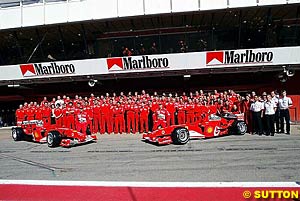 Minardi:
"Well, Ferrari have such an advantage in their organisation; their working
group has been the same for more than six years, so you don't beat them by
changing the rules of the game, because they will always be more reactive
compared to everyone else. You can beat Ferrari only by improving, while
avoiding making mistakes, which Mercedes and BMW - or McLaren and Williams
- have made all these years. They have made some insane mistakes. You
can't say it's just Ferrari's merit, as it's also the others' fault. You
can't look for performance if you can't even get to the chequered flag.
Minardi:
"Well, Ferrari have such an advantage in their organisation; their working
group has been the same for more than six years, so you don't beat them by
changing the rules of the game, because they will always be more reactive
compared to everyone else. You can beat Ferrari only by improving, while
avoiding making mistakes, which Mercedes and BMW - or McLaren and Williams
- have made all these years. They have made some insane mistakes. You
can't say it's just Ferrari's merit, as it's also the others' fault. You
can't look for performance if you can't even get to the chequered flag.
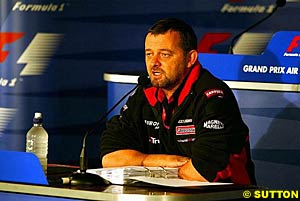 ML: At last year's Canadian Grand Prix, in the space of a few
hours Ecclestone said that, since Minardi couldn't afford being in F1 with
so little money, they should get out. Hours later came the announcement
that he invested his own money in Minardi to help out the team. How does
that work out?
ML: At last year's Canadian Grand Prix, in the space of a few
hours Ecclestone said that, since Minardi couldn't afford being in F1 with
so little money, they should get out. Hours later came the announcement
that he invested his own money in Minardi to help out the team. How does
that work out?
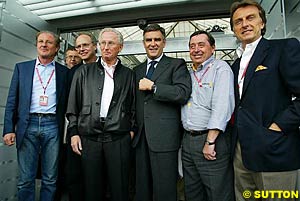 Minardi: "I
have difficulties looking four years in the future, when in the past two
years most of the members taking the programme forwards have changed. How
many more will change? These are directors of car manufacturing companies
and as such are bound to be changed through time. Just look at Fiat:
they've changed three of them. The same for BMW, and the same will happen
in Mercedes. It's changing in Renault. On the other side there is one
(Ecclestone) who, whether he's too old or not, it's still the same person.
I find it difficult to think there will be two series, because first of
all there's a lack of drivers, and then there's a lack of money. But
anyway, in my opinion today we don't have 40 F1 drivers."
Minardi: "I
have difficulties looking four years in the future, when in the past two
years most of the members taking the programme forwards have changed. How
many more will change? These are directors of car manufacturing companies
and as such are bound to be changed through time. Just look at Fiat:
they've changed three of them. The same for BMW, and the same will happen
in Mercedes. It's changing in Renault. On the other side there is one
(Ecclestone) who, whether he's too old or not, it's still the same person.
I find it difficult to think there will be two series, because first of
all there's a lack of drivers, and then there's a lack of money. But
anyway, in my opinion today we don't have 40 F1 drivers."
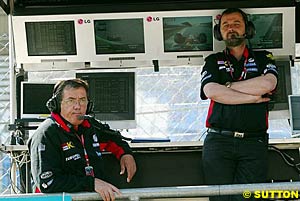 Minardi:
"If I tried to tell you what I feel it would be hard to make myself clear.
I can only say it's difficult because for 15 years I was the president of
this company, and I was very much present, independent from my partners
who would give me carte blanche (unrestricted power), and I was making the
decisions. Today, even though I can give advice, it often happens that my
advice isn't followed because it's normal that the president of the
company is the one making the decisions. Obviously if I told you it was as
easy as drinking water I would be dishonest, which I've never been in my
entire life."
Minardi:
"If I tried to tell you what I feel it would be hard to make myself clear.
I can only say it's difficult because for 15 years I was the president of
this company, and I was very much present, independent from my partners
who would give me carte blanche (unrestricted power), and I was making the
decisions. Today, even though I can give advice, it often happens that my
advice isn't followed because it's normal that the president of the
company is the one making the decisions. Obviously if I told you it was as
easy as drinking water I would be dishonest, which I've never been in my
entire life."
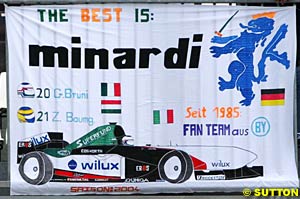 ML:
Minardi has traditionally been a well loved team in the paddock and by the
fans. However, don't you think some of Paul Stoddart's outspokenness
changed this situation?
ML:
Minardi has traditionally been a well loved team in the paddock and by the
fans. However, don't you think some of Paul Stoddart's outspokenness
changed this situation?
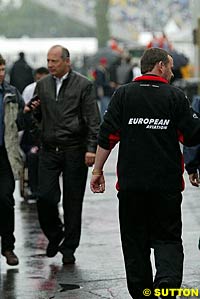 Minardi: "I
don't care. Unfortunately I don't speak it. I'm 57 and I will not speak it
in the future. I think it's more shocking to see what [Dennis] has been
incapable of doing with the budget he's had at his disposal, than to go
judging Paul Stoddart for what he might have said. I think every team in
F1 needs to be helped, because behind every team there are working
families who need to be respected.
Minardi: "I
don't care. Unfortunately I don't speak it. I'm 57 and I will not speak it
in the future. I think it's more shocking to see what [Dennis] has been
incapable of doing with the budget he's had at his disposal, than to go
judging Paul Stoddart for what he might have said. I think every team in
F1 needs to be helped, because behind every team there are working
families who need to be respected.
|
Contact the Author Contact the Editor |
Please Contact Us for permission to republish this or any other material from Atlas F1.
|
Volume 10, Issue 50
The Survivors: 20 Years of Minardi
Interview with Gian Carlo Minardi
The Passion of Stoddart
Making Something out of Nothing
The Minardi Factory Tour
Minardi's Cars Through the Lens
Minardi's Drivers Trading Cards
The Minardi Trivia Quiz
Regular Columns
On the Road
Elsewhere in Racing
The Weekly Grapevine
> Homepage |
